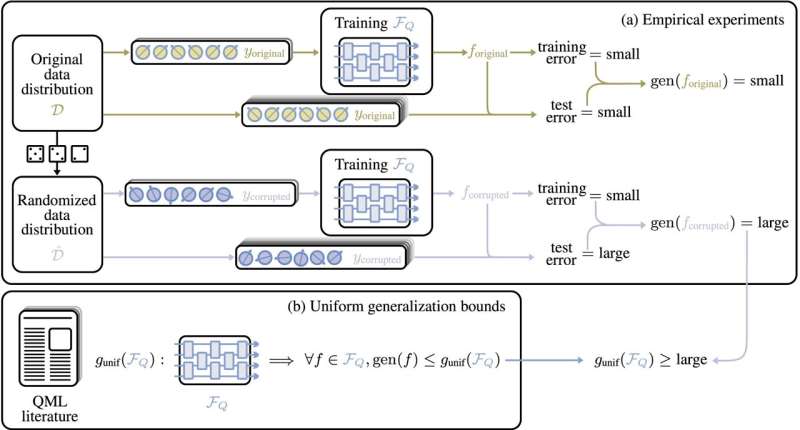This article has been reviewed according to Science X's editorial process and policies. Editors have highlighted the following attributes while ensuring the content's credibility:
fact-checked
trusted source
proofread
Redefining quantum machine learning

Machine learning is a branch of artificial intelligence (AI) and computer science that focuses on the use of data and algorithms to allow computers to learn without explicitly being programmed. While discussions surrounding AI algorithms, such as ChatGPT and other generative models, are taking place at all levels of society, the machine learning capabilities of quantum computers are still somewhat unexplored.
Researchers around the world are currently working hard to answer the question of whether quantum computers will be able to better solve some of the problems presented by conventional machine learning.
A study carried out by team of researchers from Freie Universität Berlin has now revealed remarkable insights that challenge previous assumptions about quantum machine learning. The team has discovered that neuronal quantum networks can not only learn but also memorize seemingly random data. The study, titled "Understanding Quantum Machine Learning Also Requires Rethinking Generalization" was published in Nature Communications.
Quantum computers use individual computing units based on physical principles that differ from those at work in conventional computers. They rely on individual atoms, ions, or superconducting circuitry that behave according to the laws of quantum mechanics. While quantum computers were considered nothing more than a pipe dream until only recently, they are now very much a reality—and are continuing to develop with breathtaking speed.
With quantum processor units now containing hundreds of qubits, scientists are only just beginning to discover what these computers are capable of. It is widely assumed that the quantum computers of the future will be able to solve important problems much more quickly than existing supercomputers. As such, researchers are already investigating their potential for machine learning applications.
In their new study, the researchers from Freie Universität Berlin concentrated on quantum neural networks—a promising approach within the field of quantum machine learning. The team discovered that these networks can not only learn but also memorize seemingly random data. These results defy the traditional understanding of how quantum models react to (i.e., learn from) new data—a phenomenon known as "generalization."
"It's like finding out that a 6-year-old can memorize random strings of numbers and the multiplication tables at the same time," says Elies Gil-Fuster, lead author of the study and researcher at Freie Universität Berlin and the Heinrich Hertz Institute. "Our experiments show that these quantum neural networks are incredibly adept at fitting random data and labels, challenging the very foundations of how we understand learning and generalization."
The implications of this discovery are far-reaching. It calls into question traditional measures used to gauge the generalization ability of machine learning models such as the VC dimension or the Rademacher complexity. The team's findings suggest that quantum neural networks seem to possess an inherent ability to memorize, opening up new avenues for exploration in both theoretical understanding and practical applications.
"While this doesn't necessarily mean that quantum machine learning is destined for poor generalization, it does mean that we need to rethink how we approach the problem," explains Jens Eisert, leader of the research group and professor at Freie Universität Berlin with ties to the Heinrich Hertz Institute. "Our findings suggest that we need a paradigm shift in how we conceptualize and evaluate quantum models for machine learning tasks."
According to the researchers, these findings represent a significant step forward in our understanding of quantum machine learning and its potential applications. By challenging conventional wisdom, the study paves the way for new insights and developments in this rapidly evolving field.
Underlining the importance of their findings, the researchers say, "Just as previous discoveries in physics have reshaped our understanding of the universe, this study could potentially redefine the future of quantum machine learning models. As we stand on the cusp of a new era in technology, understanding these nuances could be the key to unlocking further advancements in the field of quantum machine learning."
More information: Elies Gil-Fuster et al, Understanding quantum machine learning also requires rethinking generalization, Nature Communications (2024). DOI: 10.1038/s41467-024-45882-z


















